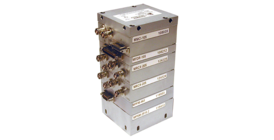- Overview
- Specifications
- Downloads
- Featured Products
- Request a Quote
- Product Support
The MCAS-104D-3 is a 4-channel single-ended piezo-electric accelerometer signal conditioning module for use in Curtiss-Wright’s MEDAU-20xx, MCDAU-20xx or MWDAU-20xxX series products. Each input channel provides a charge amplifier for interfacing with a single-ended piezo-electric accelerometer. The module then provides software programmable gain, programmable offset and programmable, DSP based, presample filtering per channel. The filter is set automatically based on the channel sample rate programmed through TTCWare.
Alternatively, a filter with a user-specified –3dB frequency that falls within limits calculated by TTCware, may be selected. The conditioned analog signal is digitized at up to 16- bit resolution for transmission in the system PCM output format.
In addition to providing digitized accelerometer data to the system PCM output format, the MCAS-104D-3 performs a digital integration on this data, which provides relative velocity data. The velocity data is itself integrated, providing displacement data. As with the acceleration data, velocity and displacement data are made available to the PCM output format at 16-bit resolution.
Key Features
- 4-channels per module
- Charge amplifier front end, suitable for use with single-ended piezo-electric accelerometers
- Available output data signals per channel:
- Acceleration
- Velocity (digitally integrated acceleration data)
- Displacement (digitally integrated velocity data)
- >1,000 MΩ input impedance (power on)
- Simultaneous sampling capability
Applications
- Flight test instrumentation
- Factory automation and process control
- Piezo-electric accelerometers, transducers, microphones
- Research measurements and experiments

